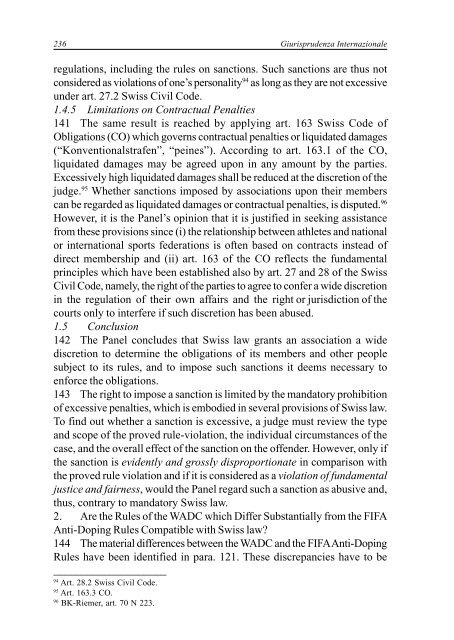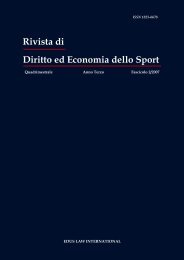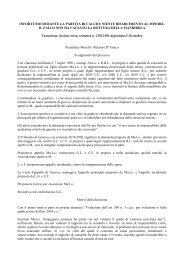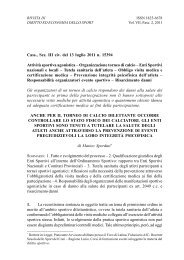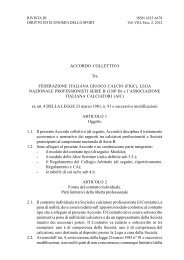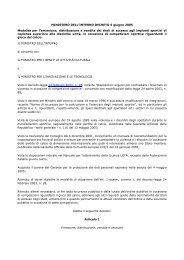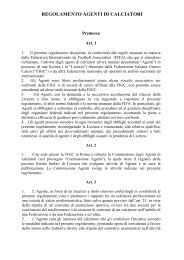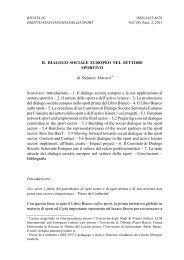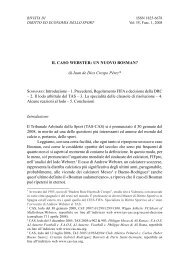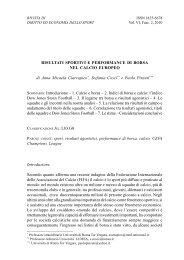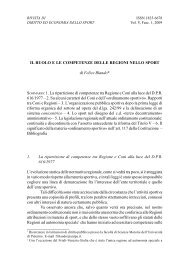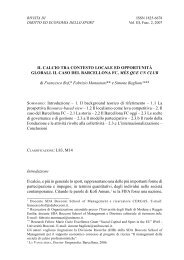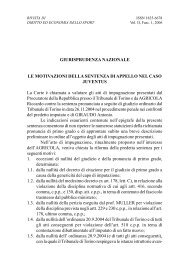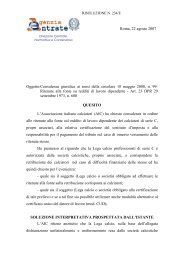Rivista di Diritto ed Economia dello Sport - Rdes.it
Rivista di Diritto ed Economia dello Sport - Rdes.it
Rivista di Diritto ed Economia dello Sport - Rdes.it
You also want an ePaper? Increase the reach of your titles
YUMPU automatically turns print PDFs into web optimized ePapers that Google loves.
236 Giurisprudenza Internazionaleregulations, inclu<strong>di</strong>ng the rules on sanctions. Such sanctions are thus notconsider<strong>ed</strong> as violations of one’s personal<strong>it</strong>y 94 as long as they are not excessiveunder art. 27.2 Swiss Civil Code.1.4.5 Lim<strong>it</strong>ations on Contractual Penalties141 The same result is reach<strong>ed</strong> by applying art. 163 Swiss Code ofObligations (CO) which governs contractual penalties or liquidat<strong>ed</strong> damages(“Konventionalstrafen”, “peines”). Accor<strong>di</strong>ng to art. 163.1 of the CO,liquidat<strong>ed</strong> damages may be agre<strong>ed</strong> upon in any amount by the parties.Excessively high liquidat<strong>ed</strong> damages shall be r<strong>ed</strong>uc<strong>ed</strong> at the <strong>di</strong>scretion of thejudge. 95 Whether sanctions impos<strong>ed</strong> by associations upon their memberscan be regard<strong>ed</strong> as liquidat<strong>ed</strong> damages or contractual penalties, is <strong>di</strong>sput<strong>ed</strong>. 96However, <strong>it</strong> is the Panel’s opinion that <strong>it</strong> is justifi<strong>ed</strong> in seeking assistancefrom these provisions since (i) the relationship between athletes and nationalor international sports f<strong>ed</strong>erations is often bas<strong>ed</strong> on contracts instead of<strong>di</strong>rect membership and (ii) art. 163 of the CO reflects the fundamentalprinciples which have been establish<strong>ed</strong> also by art. 27 and 28 of the SwissCivil Code, namely, the right of the parties to agree to confer a wide <strong>di</strong>scretionin the regulation of their own affairs and the right or juris<strong>di</strong>ction of thecourts only to interfere if such <strong>di</strong>scretion has been abus<strong>ed</strong>.1.5 Conclusion142 The Panel concludes that Swiss law grants an association a wide<strong>di</strong>scretion to determine the obligations of <strong>it</strong>s members and other peoplesubject to <strong>it</strong>s rules, and to impose such sanctions <strong>it</strong> deems necessary toenforce the obligations.143 The right to impose a sanction is lim<strong>it</strong><strong>ed</strong> by the mandatory prohib<strong>it</strong>ionof excessive penalties, which is embo<strong>di</strong><strong>ed</strong> in several provisions of Swiss law.To find out whether a sanction is excessive, a judge must review the typeand scope of the prov<strong>ed</strong> rule-violation, the in<strong>di</strong>vidual circumstances of thecase, and the overall effect of the sanction on the offender. However, only ifthe sanction is evidently and grossly <strong>di</strong>sproportionate in comparison w<strong>it</strong>hthe prov<strong>ed</strong> rule violation and if <strong>it</strong> is consider<strong>ed</strong> as a violation of fundamentaljustice and fairness, would the Panel regard such a sanction as abusive and,thus, contrary to mandatory Swiss law.2. Are the Rules of the WADC which Differ Substantially from the FIFAAnti-Doping Rules Compatible w<strong>it</strong>h Swiss law?144 The material <strong>di</strong>fferences between the WADC and the FIFA Anti-DopingRules have been identifi<strong>ed</strong> in para. 121. These <strong>di</strong>screpancies have to be____________________94Art. 28.2 Swiss Civil Code.95Art. 163.3 CO.96BK-Riemer, art. 70 N 223.


